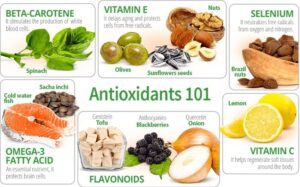You’ve probably heard this before: some foods are good for you because they are “rich in antioxidants.” But what does this really mean? Is it actually something worth considering?
The grocery stores are full of food and drinks rich in antioxidants. From the popular green tea to blueberries, you get across these probably every day. But the message here is more thoughtful. Food containing antioxidants are better for our health.Â
What are antioxidants and how do they make food better is not a mystery.
Here is what you need to know.
What are Antioxidants?
Antioxidants are small chemical compounds that can efficiently neutralize free radicals.Â
Those radicals are some strange molecules that can damage our cells severely. It can trigger some chronic conditions, such as cancer, diabetes, or heart diseases.Â
Antioxidants include minerals, vitamins (C and E), beta-carotene, zinc, lutein, selenium, and more. So, a diet rich in antioxidants might prevent or help delay disease.
More Antioxidants in Your Diet

Instead of taking more and more antioxidants supplements, prioritize eating whole grains, fruits, and, of course, vegetables.Â
For example, leafy greens not only look all-cute and tasty, but they are excellent sources of vitamin C. Chicken is a good choice, as well, because it has lots of zinc, while avocado and almonds come up with the much-needed vitamin E.Â
However, a varied diet of vegetables, fruits, lean protein, and whole grains will always be your best source of antioxidant protection.Â
Studies and Other Surveys Insights
Antioxidants are extracted from foods. Researchers consider them some mighty little fighters, and a diet of antioxidants and free radicals keeps oxidative stress in control.
Some studies indicated that people who ate a low antioxidant diet were at a bigger risk of heart diseases and other diseases. Other research measured the effects of antioxidants received via supplements. The results were mixed.
Furthermore, a more recent paper found no decrease in “major cardiovascular events,” such as stroke or heart attack, in 14,0000 participants aged 50 and older.
Check out these super vitamin C foods, too!












Leave a Reply